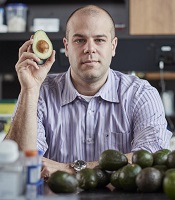
lab, surrounded by avocados
Photo by Light Imaging/
University of Waterloo
A compound derived from avocados could be effective in treating acute myeloid leukemia (AML), according to a study published in Cancer Research.
Investigators discovered that avocatin B, a lipid found in avocados, combats AML by targeting leukemia stem cells.
In in vitro experiments, avocatin B proved cytotoxic to AML stem and progenitor cells but did not affect normal hematopoietic stem cells.
“We’ve performed many rounds of testing to determine how this new drug works at a molecular level and confirmed that it targets stem cells selectively, leaving healthy cells unharmed,” said study author Paul Spagnuolo, PhD, of the University of Waterloo in Ontario, Canada.
Dr Spagnuolo and his colleagues performed a screen of a natural health product library to identify avocatin B. Subsequent experiments showed that avocatin B employs a novel mechanism to induce death in leukemic cells.
Avocatin B induces mitochondria-mediated apoptosis. The mitochondrial localization of avocatin B inhibits fatty acid oxidation and decreases levels of nicotinamide adenine dinucleotide phosphate, which results in elevated reactive oxygen species and leads to apoptosis.
Next steps
Through a partnership with the Centre for Commercialization of Regenerative Medicine, Dr Spagnuolo has filed a patent application for the use of avocatin B to treat AML. He is also performing experiments to prepare the drug for a phase 1 trial.
Dr Spagnuolo said there are other potential applications for avocatin B beyond oncology, and the drug is one of several compounds he and his team have isolated from a library of nutraceuticals. Some labs use food or plant extracts to develop nutraceuticals, but Dr Spagnuolo said he prefers the precision of using nutraceuticals with defined structures.
“Extracts are less refined,” he said. “The contents of an extract can vary from plant to plant and year to year, depending on lots of factors—on the soil, the location, the amount of sunlight, the rain.”
“Evaluating a nutraceutical as a potential clinical drug requires in-depth evaluation at the molecular level. This approach provides a clearer understanding of how the nutraceutical works, and it means we can reproduce the effects more accurately and consistently. This is critical to safely translating our lab work into a reliable drug that could be used in oncology clinics.”


